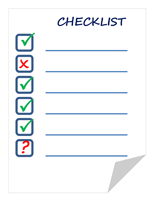 The way you sit at your desk affects your health. You could end up with chronic neck or back pain or spinal damage depending on how you sit. Follow these tips as you improve your posture and ergonomics at work.
The way you sit at your desk affects your health. You could end up with chronic neck or back pain or spinal damage depending on how you sit. Follow these tips as you improve your posture and ergonomics at work.
- Be Aware of Back Pain Certain back pain is a sign of poor posture. If you experience these symptoms, check the way you sit.
- Sudden back pain that starts when you start a new job or get a new chair.
- Back pain that continues over time.
- Pain that goes away when you switch positions.
- Pain that starts in your neck and moves down into your back.
- Increased pain during certain times of the day or week but not on weekends.
- Keep Your Body Aligned When you sit in your chair, make sure your ears, shoulders and hips remain in a straight vertical line. Your feet should be flat on the floor, and your elbows should rest at a 90-degree angle to your desk.Try not to sit with your legs crossed or your shoulders hunched forward. Also, avoid leaning to one side of your chair or tilting your head as you maintain an aligned posture.
- Invest in Ergonomic Furniture Your desk, chair and computer should all be ergonomic and encourage you to sit straight. They should adjust to ensure comfort.
- Sit on a Balance Ball Because your pelvis rocks gently toward the front of the balance ball and forces your shoulders to slightly arch, this seating option encourages proper posture. Use it at various times during the day to help you align your body.
- Use Props Several posture-friendly props reduce strain on your spine and ensure you sit straight. They include a:
- Footrest to keep your feet flat
- Small pillow or towel for lumbar support or to prevent you from bending your neck as you talk on the phone
- A stack of books under your computer monitor so that you can see it clearly without bending your neck
- Use Good Posture When You Move Whether you’re standing up from your chair, answering the phone or reaching for a pencil, keep posture in mind. Try not to stretch out of alignment or move in an unnatural way. Stiff movements can actually cause more pain.
- Stand Up and Move Frequently. Tired muscles are more likely to slump and slouch. Stand up and move for two minutes least once every half hour as you keep your body aligned.
Maintaining proper posture in the office reduces shoulder, back and hip pain as well as injuries. Starting today, follow these tips as you ensure proper posture and ergonomics during your workday.














